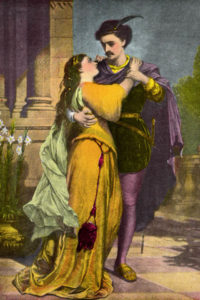I hate when people think I know everything about Shakespeare. I don’t, not even close. In fact, some of the best posts I’ve made have been when I just put it out there and say, “I just noticed this, let’s talk about it.” But there are also times when I feel like there’s stuff I should know, and don’t, and it bugs me. Normally I bother Bardfilm with these questions. So I thought for a change I’d start posting them here, and see if we can’t get some interesting conversation going.
Two households, both alike in dignity,
In fair Verona, where we lay our scene,
From ancient grudge break to new mutiny,
Where civil blood makes civil hands unclean.
From forth the fatal loins of these two foes
A pair of star-cross’d lovers take their life;
The Prologue to Romeo and Juliet. We all know it. One of the most famous openings in literature. We all know what it means, right? There’s these two families, each family has a kid, the kids kill themselves.
*record scratch* Let’s just stop right there.
For years I’ve said, “Romeo and Juliet kill themselves. Shakespeare literally says it right in the prologue. It’s the great spoiler alert of all time. You know they’re going to die, and yet you keep watching because you have to see how it comes to that, and in a good production you’ll still be on the edge of your seat, still hoping Juliet wakes up in time, even though you know she won’t.”
And then somebody told me, “That’s not how to parse that sentence. Take their life goes with from forth the fatal loins. It means that a pair of star-crossed lovers are both. They take their life forth from the fatal loins of the families.” So yeah we still get foreshadowing on “star-crossed” and “fatal”, but the actual “take their life” line does not mean that the lovers kill themselves.
IS THAT TRUE?!
I will adjust my understanding and subsequent teaching of this passage immediately if some folks smarter than I can confirm that reading. But I’m not taking just one person’s word for it.

 h I’ve heard it argued that the Capulets were much better off than the Montagues). I don’t think modern audiences want to do the extra brain work of keeping track of who is on Romeo’s side and who is on Juliet’s. “Can’t you dress them all a certain way so I can tell by looking at them?”
h I’ve heard it argued that the Capulets were much better off than the Montagues). I don’t think modern audiences want to do the extra brain work of keeping track of who is on Romeo’s side and who is on Juliet’s. “Can’t you dress them all a certain way so I can tell by looking at them?” My younger daughter is studying Romeo and Juliet at the moment. We’ve been over that play so many times over the years that for the first few lessons I learned that she wasn’t even reading the book, she was just going from memory! Unfortunately she had her events out of order and was getting them wrong (Mercutio and Tybalt do not fight in Act I Scene 1…) but that’s not the point of this story.
My younger daughter is studying Romeo and Juliet at the moment. We’ve been over that play so many times over the years that for the first few lessons I learned that she wasn’t even reading the book, she was just going from memory! Unfortunately she had her events out of order and was getting them wrong (Mercutio and Tybalt do not fight in Act I Scene 1…) but that’s not the point of this story. So I called my daughter from work and said, “You want to go on an adventure? There’s treasure to be found.” She was up for the challenge. I texted her the bright orange and green picture of the cover and said, “Go find this picture.” She found it. I said, “Open it.”
So I called my daughter from work and said, “You want to go on an adventure? There’s treasure to be found.” She was up for the challenge. I texted her the bright orange and green picture of the cover and said, “Go find this picture.” She found it. I said, “Open it.”